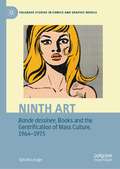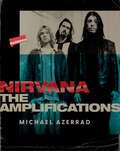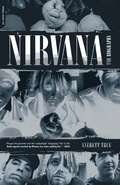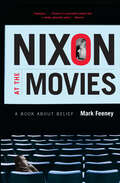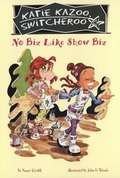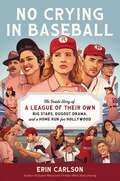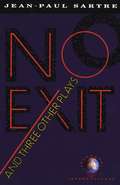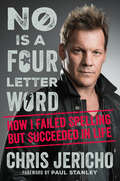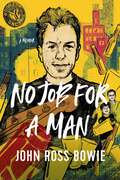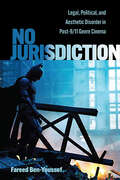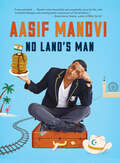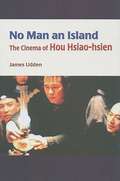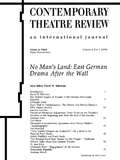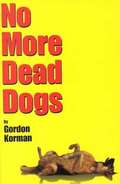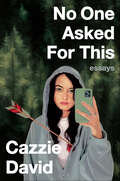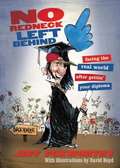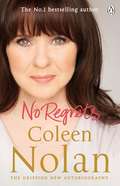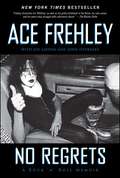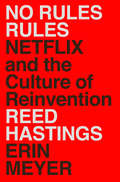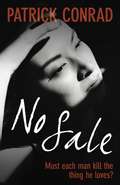- Table View
- List View
Ninjas Have Issues
by Greg StonesFrom the acclaimed author of Zombies Hate Stuff—an illustrated guide to the things that stress ninjas out. Ninjas are awesome—stealthy, cunning experts of infiltration and close combat. But like us all, they must sometimes grapple with the small but significant problems of everyday life. For instance, ninjas have issues with squirrels. They also have trouble with chimneys, pigeons, blow darts, and mimes. They really like hiding, going undercover, and piñatas, but have MAJOR issues with samurai, giant fighting robots, and unicorns. Through it all, they secretly long for just one thing . . . Artist Greg Stones turns his popular, playfully funny illustration style to the badass but surprisingly issue-fraught world of ninjas, detailing their inner lives and mortal combat with a subversive sense of the absurd. Praise for the writing of Greg Stone &“Hilarious.&” —Wired &“Stones&’s panels have a cool way of collectively turning a grin into a chuckle (and perhaps, dare it be said, into a hearty guffaw).&” —Publishers Weekly
Nintendo Magic: Winning the Videogame Wars
by Osamu InoueBack in the 80s, Nintendo ruled the home-entertainment market with the NES (Nintendo Entertainment System). But then rival Sony introduced PlayStation, which featured advancements and cutting-edge technology that put Nintendo's Super-NES to shame. Nintendo quickly lost its dominant market share to Sony and found itself floundering. In 2006, Nintendo released Wii at the same time Sony introduced its highly-anticipated and much-vaunted PlayStation III and Microsoft's XBox 360. Wii's David defeated PlayStation's Goliath, inversely echoing the SNES/PlayStation outcome of a decade previous. Nintendo Magic: Winning the Videogame Wars is the story of what went right, discussing the business strategies and marketing savvy that took on the mighty Sony and won.Topics include:How where you put your company is just as important as how you run it: being in KyotoFrom work force to policies, why Nintendo's "just enough" attitude succeedsWhy the ability to read a balance sheet is overratedRespect seniority but approve huge R&D budgets for talented junior employeesAllowing maximum communication between disparate divisions (hardware and software)Enlarging the pie: going after casual gamers (The art of mainstreaming)How the Wii will be the next major household appliance and the DSi will be the cell phone of the future.Nintendo Magic: Winning the Videogame Wars should serve as a warning to similar powerhouse industries never to understimate the modest competitor. It should occupy the bookshelf of any business person smart enough to know they don't need to be a giant to win.
Ninth Art. Bande dessinée, Books and the Gentrification of Mass Culture, 1964-1975 (Palgrave Studies in Comics and Graphic Novels)
by Sylvain LesageIn France, comics are commonly referred to as the "ninth art". What does it mean to see comics as art? This book looks at the singular status of comics in the French cultural landscape. Bandes dessinées have long been published in French newspapers and magazines. In the early 1960s, a new standard format emerged: large hardback books, called albums. Albums played a key role in the emergence of the ninth art and its acceptance among other forms of literary narrative. From Barbarella in 1964 to La Ballade de la mer salée in 1975, from Astérix and its million copies to Tintin and its screen versions, within the space of just a few years the comics landscape underwent a deep transformation.The album opened up new ways of creating, distributing, and reading bandes dessinées. This shift upended the market, transformed readership, initiated new transmedia adaptations, generated critical discourse, and gave birth to new kinds of comics fandom. These transformations are analysed through a series of case studies, each focusing on a noteworthy album. By retracing the publishing and critical history of these classic bandes dessinées, this book questions the blind spots of a canon based on the album format and uncovers the legitimisation processes that turned bande dessinée into the ninth art.
Nirvana: The Amplifications
by Michael AzerradMichael Azerrad reflects on the meaning of the revolutionary band, Nirvana, his friendship with Kurt Cobain, and the impact of the '90s thirty years later. Includes 20 images of posters and ephemera from the time. Note: This is the compilation of the essay-like annotations from THE AMPLIFIED COME AS YOU ARE: The Story of Nirvana, excluding the underlying 1993 book.
Nirvana: The Biography
by Everett TrueAs the assistant editor of Melody Maker, Everett True was the first journalist to cover the Seattle music scene in early 1989 and interview Nirvana. <P><P> He is responsible for bringing Hole, Pavement, Soundgarden, and a host of other bands to international attention. He introduced Kurt Cobain to Courtney Love, performed on stage with Nirvana on numerous occasions, and famously pushed Kurt onto the stage of the Reading Festival in 1992 in a wheelchair. Nirvana: The Biography is an honest, moving, incisive, and heartfelt re-evaluation of a band that has been misrepresented time and time again since its tragic demise in April 1994 following Kurt Cobain's suicide. True captures what the band was really like. He also discusses the music scene of the time-the fellow bands, the scenes, the seminars, the countless live dates, the friends and allies and drug dealers. Drawn from hundreds of original interviews, Nirvana: The Biography is the final word on Nirvana, Cobain, and Seattle grunge.
Nixon at the Movies: A Book about Belief
by Mark Feeney&“People will be arguing over Nixon at the Movies as much as, for more than half a century, the country at large has been arguing about Nixon.&”—Greil Marcus Richard Nixon and the film industry arrived in Southern California in the same year, 1913, and they shared a long and complex history. The president screened Patton multiple times before and during the invasion of Cambodia, for example. In this unique blend of political biography, cultural history, and film criticism, Mark Feeney recounts in detail Nixon&’s enthusiastic viewing habits during his presidency, and takes a new and often revelatory approach to Nixon&’s career and Hollywood&’s, seeing aspects of Nixon&’s character, and the nation&’s, refracted and reimagined in film. Nixon at the Movies is a &“virtuosic&” examination of a man, a culture, and a country in a time of tumult (Slate). &“By Feeney's count, Nixon, an unabashed film buff, watched more than 500 movies during the 67 months of his presidency, all carefully listed in an appendix titled &‘What the President Saw and When He Saw It.&’ Nixon concentrated intently on whatever was on the screen; he refused to leave even if the picture was a dud and everyone around him was restless. He was omnivorous, would watch anything, though he did have his preferences…Only rarely did he watch R-rated or foreign films. He liked happy endings. Movies were obviously a means of escape for him, and as the Watergate noose tightened, he spent ever more time in the screening room.&”—The New York Times
No Biz Like Show Biz (Katie Kazoo Switcheroo #24)
by Nancy KrulikWhen Miriam gets Suzanne's role in the school play, Katie knows there will be trouble. But she certainly doesn't plan on being involved in it! Unfortunately, the magic wind has plans of its own it turns Katie into Miriam just before the show!
No Crying in Baseball: The Inside Story of A League of Their Own: Big Stars, Dugout Drama, and a Home Run for Hollywood
by Erin CarlsonNational Bestseller The inside story of how A League of Their Own—one of the most beloved baseball movies of all time—developed from an unheralded piece of American history into a perennial cinematic favorite. Featuring exclusive interviews and behind the scenes memories from the original cast and creators, .No Crying in Baseball is a rollicking, revelatory deep dive into a one‑of‑a‑kind film. Before A League of Their Own, few American girls could imagine themselves playing professional ball (and doing it better than the boys). But Penny Marshall's genre outlier became an instant classic and significant aha moment for countless young women who saw that throwing like a girl was far from an insult. Part fly‑on‑the‑wall narrative, part immersive pop nostalgia, No Crying in Baseball is for readers who love stories about subverting gender roles as well as fans of the film who remain passionate thirty years after its release. With key anecdotes from the cast, crew, and diehard fanatics, Carlson presents the definitive, first‑ever history of the making of the treasured film that inspired generations of Dottie Hinsons to dream bigger and aim for the sky.
No Exit and Three Other Plays
by Jean-Paul SartreFour plays about an existential portrayal of Hell, the reworking of the Electra-Orestes story, the conflict of a young intellectual torn between theory and conflict and an arresting attack on American racism.
No Holding Back
by Amanda HoldenActress, presenter, talent show judge. Daughter, wife, mother, survivor. There's so much more to Amanda Holden than fame.A natural-born performer, Amanda's journey to becoming one of the most recognisable faces on our screens today has been one full of love, laughter and tears. A British star and nationally treasured actress, she has appeared on our screens and stages for over 20 years. In the notoriously tricky world of show business, Amanda has carved out her own identity and enjoyed impressive longevity, not least as the longest running judge on hit ITV show Britain's Got Talent. She never fails to keep her audience engaged and entertained. Charming, funny and incredibly honest, her story is remarkable. For the first time, No HoldingBacktells it in her own words, in her own way, and shows her fans the real woman behind the headlines.
No Holding Back
by Amanda HoldenActress, presenter, talent show judge. Daughter, wife, mother, survivor. There's so much more to Amanda Holden than fame.A natural-born performer, Amanda's journey to becoming one of the most recognisable faces on our screens today has been one full of love, laughter and tears. A British star and nationally treasured actress, she has appeared on our screens and stages for over 20 years. In the notoriously tricky world of show business, Amanda has carved out her own identity and enjoyed impressive longevity, not least as the longest running judge on hit ITV show Britain's Got Talent. She never fails to keep her audience engaged and entertained. Charming, funny and incredibly honest, her story is remarkable. For the first time, No HoldingBacktells it in her own words, in her own way, and shows her fans the real woman behind the headlines.
No Invitation Required: The Pelham Cottage Years
by Lady Annabel GoldsmithPelham Cottage - with its infamous unlocked back gate - was where Annabel Goldsmith kept an open house for some of the most sophisticated and iconic people of the 1960s and 1970s.Lady Annabel Goldsmith - society hostess and eponym for an exclusive Mayfair nightclub - recounts life in her Kensington home during the 60s and 70s, where she operated an open door policy and entertained some of the most extraordinary figures of her inner circle and icons of the era.But Pelham Cottage was not just a dazzling party scene - it was also a treasured family home that provided longed-for stability and happiness, and where Lady Annabel raised her family. A time of huge personal change, Lady Annabel shares her most intimate memories of those cherished days, offering fascinating insight into her own character as well as the swirl of London's hedonistic decades.
No Is a Four-Letter Word: How I Failed Spelling but Succeeded in Life
by Chris Jericho Paul StanleyThree-time New York Times bestselling author and six-time WWE champion Chris Jericho shares 20 of his most valuable lessons for achieving your goals and living the life you want, jam-packed with fantastic stories and the classic off-the-wall, laugh-out-loud Jericho references he's famous for, with a foreword by Paul Stanley.Chris Jericho has known what he wanted out of life since he was a teenager: to be a pro wrestler and to be in a rock 'n' roll band. Most of his high school friends felt that he lacked the tools necessary to get into either, but Chris believed in himself. With the wise words of Master Yoda echoing through his head ("Do or do not. There is no try."), he made it happen. As a result, Chris has spent a lifetime doing instead of merely trying, managing to achieve his dreams while learning dozens of invaluable lessons along the way.No Is a Four-Letter Word distills more than two decades of showbiz wisdom and advice into twenty easy-to-carry chapters. From developing a strong work ethic thanks to WWE chairman Vince McMahon, remembering to always look like a star from Gene Simmons of KISS, learning to let it go when the America's Funniest Home Videos hosting gig goes to his rival, adopting a sense of perpetual reinvention from the late David Bowie, making sure to sell himself like his NHL-legend father Ted Irvine taught him, or going the extra mile to meet Keith Richards (with an assist from Jimmy Fallon), Chris has learned countless lessons during his decades-long career. Now, in the hopes that those same principles might help and inspire his legions of fans, Chris has decided to share them while recounting the fantastic and hilarious stories that led to the birth of these rules. The result is a fun, entertaining, practical, and inspiring book from the man with many scarves but only one drive: to be the best. After reading No Is a Four-Letter Word, you'll discover that you might have what it takes to succeed as well...you just need to get out there and do it. That's what Jericho would do.
No Job for a Man: A Memoir
by John Ross BowieA darkly witty, deeply affecting, and finely crafted memoir by the Big Bang Theory andSpeechless star and comedian, John Ross Bowie.From his earliest memories of watching Rhoda with his parents in their tiny Hell&’s Kitchen apartment, John knew that he wanted to be an actor. The strange, alternate world of television—where people always cracked the perfect joke, lived in glamorous Upper East Side buildings, and made up immediately after fighting—seemed far better than his own home life, with a mother and father on the brink of divorce and a neighborhood full of crumbling pre-war architecture and not-so-occasional muggings. And yet that other world also seems unattainable. Besides crippling stage fright (which would take him years to overcome) John's father, ever aloof and cynical, has instilled within him the notion that acting is &“no job for a man.&” His father would impart that while theater, film, and television should be consumed and even debated, to create was no way to make a living or support a family. Putting aside his acting dreams, John stumbles through his twenties. He tries his hand at teaching and other traditional occupations, but nothing feels nearly as fulfilling as playing with his fleetingly on-the-map punk band, Egghead. When he and his bandmates break up, John lands a joyless job copywriting for a consulting agency and slips into a dark depression. He loses weight, begins drinking heavily, and his relationships flounder. But everything changes when John discovers improv (and anti-depressants). As a part of New York&’s now-famous Upright Citizens Brigade, John not only explores his passion for acting and comedy—and begins to envision himself doing so professionally—he also meets his future wife and fellow actor, Jamie Denbo. No Job for a Man follows the couple as they relocate to Los Angeles and try to make it in the arts, meeting success and failure, wins and losses, despair and hope along the way. Though his father chronically refuses to acknowledge pride in his adult son&’s accomplishments, John comes to realize what being a man truly means.
No Jurisdiction: Legal, Political, and Aesthetic Disorder in Post-9/11 Genre Cinema (SUNY series, Horizons of Cinema)
by Fareed Ben-YoussefNo Jurisdiction interweaves autobiography and analysis to explore how a disabled American of French-Arab descent justifies his love for the (super)heroes who destroy brown people like himself. Framing Hollywood genre films as a key to understanding a crisis-filled world shaped by the global War on Terror, Fareed Ben-Youssef shows how, in response to 9/11, filmmakers and lawmakers mobilized iconic characters—the cowboy, the femme fatale, and the superhero—to make sense of our traumas and inspire new legal landscapes. The competing visions of power produced in this dialogue between Hollywood entertainment and mainstream politics underscore genre cinema's multivalent purpose: to normalize state violence and also to critique it.Chapters devoted to the Western, film noir, superhero movies, and global films that deploy and comment on these genres offer compelling readings of films ranging from the more apparent (The Dark Knight, Sicario, and Logan) to the more unexpected (Sin City, Adieu Gary, The Broken Circle Breakdown, and Tokyo Sonata). Through narratives of states of emergency that include vaguely defined enemies, obscured battlefield boundaries, and blurred lines between victims and perpetrators, a new post-9/11 film canon emerges. No Jurisdiction is a deeply personal work of film scholarship, arguing that we can face our complicity and discover opportunities for resistance through our beloved genre movies.
No Land's Man
by Aasif MandviThe actor shares a heartfelt “collection of humorous essays that explore his myriad identities: Indian, Muslim, British, and American” (The Boston Globe).“My father moved our family to the United States because of a word. It was a word whose meaning fascinated him. It was a singularly American word, a fat word, a word that could only be spoken with decadent pride. That word was . . . Brunch! “The beauty of America,” he would say, “is they have so much food, that between breakfast and lunch they have to stop and eat again.”“—from “International House of Patel”If you’re an Indo-Muslim-British-American actor who has spent more time in bars than mosques over the past few decades, turns out it’s a little tough to explain who you are or where you are from. In No Land’s Man Aasif Mandvi explores this and other conundrums through stories about his family, ambition, desire, and culture that range from dealing with his brunch-obsessed father, to being a high-school-age Michael Jackson impersonator, to joining a Bible study group in order to seduce a nice Christian girl, to improbably becoming America’s favorite Muslim/Indian/Arab/Brown/Doctor correspondent on The Daily Show with Jon Stewart.This is a book filled with passion, discovery, and humor. Mandvi hilariously and poignantly describes a journey that will resonate with anyone who has had to navigate his or her way in the murky space between lands. Or anyone who really loves brunch.“Best Comedy Books of 2014” selection by The Washington PostPraise for No Land’s Man“I was enthralled . . . . Mandvi writes beautifully and comedically about his life, with wonderful dialogue and revealing detail, reminiscent of David Sedaris.” —Jonathan Ames, author of Wake Up, Sir!“It always bothered me that Aasif was more than merely funny—he’s also a great actor. Now I’ve learned he’s an amazing storyteller as well, and I am furious . . . but also grateful. Aasif’s movement between cultures and genres is what makes him and his story singularly funny, poignant, and essential.” —John Hodgman, author of The Areas of My Expertise and More Information Than You Require“Aasif is my favorite Indo-Muslim-British-American Daily Show correspondent ever. I loved No Land’s Man!” —Jim Gaffigan, author of Dad Is Fat and Food: A Love Story“A lighthearted but heartfelt portrait of Mandvi’s childhood and his struggles to come to terms with his rather complicated life.” —The Boston Globe
No Man an Island
by James UddenThis pioneering study of Hou Hsiao-hsien illuminates the many distinctive achievements of Taiwan's famous director. His body of work in films such as The Puppetmaster, City of Sadness, and Flowers of Shanghai reflects a powerfully unique style characterized by intricate lighting, improvisational acting, and exceptionally long, static shots. James Udden argues that Hou's films reflect Taiwan's peculiar historical and geographical situation and could only have emerged there. Udden also examines the regional impact Hou's films have had on other Asian directors and cinema artists.
No Man's Land
by David W. RobinsonThe political events of "annus mirabilis" 1989 marked a rare turning point in world history, but the significance of the year for German literary history is unique. As the 40-year-old German Democratic Republic ceased to exist, so too did the special circumstances which had fostered a literature separate from and in competition with that of the Federal Republic of Germany. A new period of literary history was delimited almost overnight: Germany Democratic Republic literature now was something to be examined as a whole, cultural movement. At the same time, the literary traditions of the German Democratic Republic have continued to influence the contemporary cultural scene, often in ways that are only gradually becoming clear.The essays, memoirs, and plays collected in this special issue of Contemporary Theatre Review represent an early attempt to assess and reassess one of the German Democratic Republic's richest cultural domains: its theatre. Contributors include David W. Robinson, C
No More Dead Dogs
by Gordon KormanFootball hero Wallace Wallace is sentenced to detention attending rehearsals of the school play where, in spite of himself, he becomes wrapped up in the production and begins to suggest changes that improve not only the play but his life as well.
No One Asked For This: Essays
by Cazzie DavidA NEW YORK TIMES BESTSELLER. From writer/director Cazzie David comes a series of acerbic, darkly funny essays about anxiety, social media, misanthropy, and growing up in a wildly eccentric family.For Cazzie David, the world is one big trap door leading to death and despair and social phobia. From shame spirals caused by hookups to panic attacks about being alive and everyone else having to be alive too, David chronicles her life’s most chaotic moments with wit, bleak humor, and a mega-dose of self-awareness. In No One Asked for This, David provides readers with a singular but ultimately relatable tour through her mind, as she explores existential anxiety, family dynamics, and the utterly modern dilemma of having your breakup displayed on the Internet. With pitch-black humor resonant of her father, comedy legend Larry David, and topics that speak uniquely to generational malaise, No One Asked for This is the perfect companion for when you don’t really want a companion."Blisteringly honest...kind of like if a David Sedaris book was written by an anxiety-ridden millennial who grew up in Hollywood."—Entertainment Weekly "Cazzie David is the delicious antidote to the poison of basic influencer culture. This book will make all misanthropes feel seen and loved—well, seen and tolerated."—Diablo Cody, screenwriter and author of Candy Girl
No Redneck Left Behind: Facing the Real World After Gettin' Your Diploma
by Jeff FoxworthyThey say your school years are your best years. That's a lie. There are plenty of good days ahead of you, unless you took so long to graduate that people thought you were in the seventeenth grade. Now it's time to take what you've learned in classes such as math, biology and introductory drywall hanging and make a success of your life. Okay, maybe you can at least stay off of COPS or Judge Judy. You might be a redneck if ... Your resume includes your high scores on video games. You think the ability to hold a job is overrated. You've asked a hairstylist for a "business at the front, party at the back" cut. You list "beginner's luck" as a skill on a job application. Your savings account is in the ashtray of your truck.
No Regrets
by Coleen NolanNo Regrets is Coleen Nolan's gripping new memoir about love and heartbreak.As a member of the Nolan sisters, Coleen Nolan was born into the spotlight and has stayed there ever since. She has now become one of the nation's favourite TV presenters and is used to newspapers and magazines claiming to have the inside story of her private life. In No Regrets Coleen finally reveals the truth of what really happened during the last few rollercoaster years, truly the worst of her life.Whilst it's certainly been a traumatic time for the whole family, Coleen is a survivor. First and foremost, she is a mum and is determined to hold her family together.The Nolans finally put aside their infamous feud to rally round their beloved sister Bernie, who tragically lost her fight with cancer on the 4th of July last year, aged just 52. In this memoir, Coleen movingly describes her struggle to deal with the emotional scars that come from losing someone so close and the effect it has had on her own life.Coleen also reveals the secret that she has been hiding from prying eyes: her second marriage and 'happy ever after' with musician Ray Fensome was pushed to breaking point by a series of rows and separations. Here, for the first time, Coleen reveals how she has battled to save her marriage and to stop her family being torn apart.In this incredibly candid memoir, Coleen writes with raw honesty about her family troubles, her career highs and lows, and her struggle with her body image. In recent years, Coleen has found herself in both a plastic surgeon's office looking at a £20,000 bill to 'fix her face' and at a breast cancer clinic asking for the removal of her healthy breasts to avoid becoming the fourth sister in the family to be struck down by cancer.Wonderfully warm and moving, and brilliantly funny and honest, No Regrets will take you from laughter to tears and back again as you share in Coleen's very personal journey.
No Regrets: A Rock 'n' Roll Memoir
by Joe Layden Ace Frehley John OstroskyTHE MUSIC, THE MAKEUP, THE MADNESS, AND MORE. . . . In December of 1972, a pair of musicians placed an advertisement in the Village Voice: “GUITARIST WANTED WITH FLASH AND ABILITY.” Ace Frehley figured he had both, so he answered the ad. The rest is rock ’n’ roll history.He was just a boy from the Bronx with stars in his eyes. But when he picked up his guitar and painted stars on his face, Ace Frehley transformed into “The Spaceman”—and helped turn KISS into one of the top-selling bands in the world. Now, for the first time, the beloved rock icon reveals his side of the story with no-holds-barred honesty . . . and no regrets.For KISS fans, Ace offers a rare behind-the-makeup look at the band’s legendary origins, including the lightning-bolt logo he designed and the outfits his mother sewed. He talks about the unspoken division within the band—he and Peter Criss versus Paul Stanley and Gene Simmons—because the other two didn’t “party every day.” Ace also reveals the inside story behind his turbulent breakup with KISS, their triumphant reunion a decade later, and his smash solo career. Along the way, he shares wild stories about dancing at Studio 54 with “The Bionic Woman,” working as a roadie for Jimi Hendrix, and bar-flying all night with John Belushi. In the end, he comes to terms with his highly publicized descent into alcohol, drugs, and self-destruction—ultimately managing to conquer his demons and come out on top. This is Ace Frehley.No makeup.No apologies.No regrets.
No Rules Rules: Netflix and the Culture of Reinvention
by Erin Meyer Reed HastingsThere has never before been a company like Netflix. It has led nothing short of a revolution in the entertainment industries, generating billions of dollars in annual revenue while capturing the imaginations of hundreds of millions of people in over 190 countries. But to reach these great heights, Netflix, which launched in 1998 as an online DVD rental service, has had to reinvent itself over and over again. This type of unprecedented flexibility would have been impossible without the counterintuitive and radical management principles that cofounder Reed Hastings established from the very beginning. Hastings rejected the conventional wisdom under which other companies operate and defied tradition to instead build a culture focused on freedom and responsibility, one that has allowed Netflix to adapt and innovate as the needs of its members and the world have simultaneously transformed. <p><p> Hastings set new standards, valuing people over process, emphasizing innovation over efficiency, and giving employees context, not controls. At Netflix, there are no vacation or expense policies. At Netflix, adequate performance gets a generous severance, and hard work is irrelevant. At Netflix, you don’t try to please your boss, you give candid feedback instead. At Netflix, employees don’t need approval, and the company pays top of market. When Hastings and his team first devised these unorthodox principles, the implications were unknown and untested. But in just a short period, their methods led to unparalleled speed and boldness, as Netflix quickly became one of the most loved brands in the world. <p> Here for the first time, Hastings and Erin Meyer, bestselling author of The Culture Map and one of the world’s most influential business thinkers, dive deep into the controversial ideologies at the heart of the Netflix psyche, which have generated results that are the envy of the business world. Drawing on hundreds of interviews with current and past Netflix employees from around the globe and never-before-told stories of trial and error from Hastings’s own career, No Rules Rules is the fascinating and untold account of the philosophy behind one of the world’s most innovative, imaginative, and successful companies.
No Sale
by Patrick Conrad Jonathan LynnFor Victor Cox, a professor of film history, the Hollywood films noirs of the 1940s and 1950s are more real than his daily life. When his wife is found drowned, Cox is the first murder suspect. He falls in love with a student who looks like the 1920s film star Louise Brooks, but she disappears at a Belgian seaside resort. Smeared in lipstick in their hotel room are the words "No Sale," the same words Elizabeth Taylor wrote on a mirror in Butterfield 8. Subsequently, a series of gruesome killings of young women, all modeled on violent deaths in films that he knows and loves, lead the police back to Cox, who starts to doubt his own sanity and innocence.With its stylish writing, pointed references to cinema classics, and blend of horror and humor, this is a powerful psychological thriller. It won the Diamond Bullet Award, the Edgar Award for Belgium.'We all know about life imitating art, but what about novels imitating film-film noir in particular? Patrick Conrad's No Sale (the words written in lipstick on a mirror by Gloria Wandrous, the Elizabeth Taylor character in Butterfield 8) is only the latest in a short list of crime fiction that draws on film noir for both plot and mood. It makes a peculiar kind of fictional sense that characters obsessed with film noir would find the worlds of the films they adore superimposed upon their personal lives. Make sure your subscription to Netflix is up-to-date before sampling this hypnotic novel.' Booklist'Imagine a metafiction serial-killer thriller written by Paul Auster on speed.When even the investigating cop sees himself as Dirty Harry, this amusing, teasing, film-crazy novel keeps you guessing through every reel.' Crime Time'Surprisingly zippy read which moves at a fair clip, the pace maintained by cinematic scene shifts and splashes of black humour. Who was it said that crime fiction in translation was never fun?That was probably me.' ShotsmagPatrick Conrad, born in 1945 in Antwerp, is a Flemish poet, screenwriter, film director, and novelist. He lives in Provence, in the south of France. Limousine, a previous novel, is being made into a film with Kelsey Grammar, to be released in 2012.


